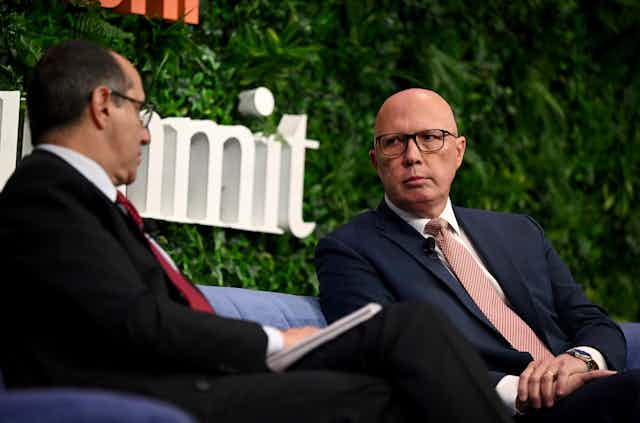In his strongest speech yet on the Coalition’s commitment to pursuing nuclear power, Peter Dutton dug deep into the past to try to discredit Climate Change and Energy Minister Chris Bowen.
“Our nation is diminished in having Chris Bowen as the federal Energy Minister”, Dutton told a business conference in Sydney on Tuesday. Apart from showing “complete irreverence for the truth”, Bowen was “a modern-day Rex Connor”.
Dutton inserted a qualification to his disparaging of the one-time minerals and energy minister: Connor “believed in nuclear energy”.
The potency of invoking the Connor name to sledge Bowen is dubious. Most people in the general community today wouldn’t have heard of him, unless they’re seniors, mining industry buffs, or know their Whitlam government history.
Connor was at the centre of that government’s notorious loans affair, hanging around a telex late in the night seeking (unsuccessfully) a huge foreign loan through a shady intermediary. He was boldly ambitious in policy – though those ambitions were often unrealised and unrealistic – and politically divisive. He was conventionally known as “The Strangler”.
Bowen is the minister driving the massive energy transformation modern Australia is undergoing. The Connor sledge might be over-the-top, but Dutton and Bowen are in each other’s sights, and it will be an “anything goes” battle until the election.
Dutton told his audience the government didn’t have “a credible pathway” to zero emissions by 2050.
“I believe that too many leaders, CEOs, and inner-city advocates have burrowed so deeply down this rabbit hole to a renewables wonderland that they have lost all sense of objectivity,” he said.
“Instead of having a proper debate about what’s in our country’s best interests, Mr Bowen acts like a child and dismisses everything he disagrees with as a ‘scare campaign’.
"His behaviour is symptomatic of his government whose energy policy is grounded in ideology rather than pragmatism.”
With his ever-more enthusiastic embrace of nuclear, Dutton is making the energy transition a point of the sharpest difference between the government and opposition for the 2025 election.
Read more: View from The Hill: Peter Dutton talks up nuclear replacements for coal-fired generators
“Under the Coalition’s plan, Australians will get cheaper power, consistent power and increasingly cleaner power,” he said.
Undeterred by pushback from Labor and scepticism from many experts about cost and impracticability, Dutton said: “If there was ever a time to consider nuclear energy, it is now”.
Not that he’s promising a quick fix.
“Of course, we can’t switch on a system tomorrow. It’s a long journey ahead,” which would involve a Coalition government ramping up gas.
Earlier, when the Coalition was focused on small nuclear reactors, a “DO YOU WANT A REACTOR IN YOUR BACK YARD?” scare campaign was obvious. Now Dutton is talking about a limited number of nuclear facilities at sites where coal-fired power stations will be closing down.
He said there would be only “in the vicinity of about six sites where new nuclear technologies could be placed”. These would be “on, or near the sites, of decommissioned or retiring coal-fired power plants using the existing grid”, thus avoiding the currently planned massive roll-out of new transmission lines.
Labor paints the opposition as ideologically opposed to renewables. Dutton maintained it supported renewables having a significant role in the system. But the government’s “renewables only” policy was “an engineering feat of pure fantasy”, and “economically and environmentally damaging”.
“Labor sees nuclear power as a competitor to renewables.
"We see nuclear power as a companion to renewables.”
Tapping into the discontent in some regional about transmission lines and windfarms, Dutton also sought to bring morality into the mix.
“There’s a moral element to this argument as well – pitching one Australian against the other, whether you live in a capital city or whether you live in a regional area.”
Dutton contested the critics’ argument about price; as for waste, he said “all the used-fuel produced by the US nuclear industry since the 1950s would fit in the area the size of a football field, to a depth of about nine meters”.
“Australia is the only country in the top 20 economies which hasn’t embraced domestic nuclear power or is taking steps to do so,” he said.

